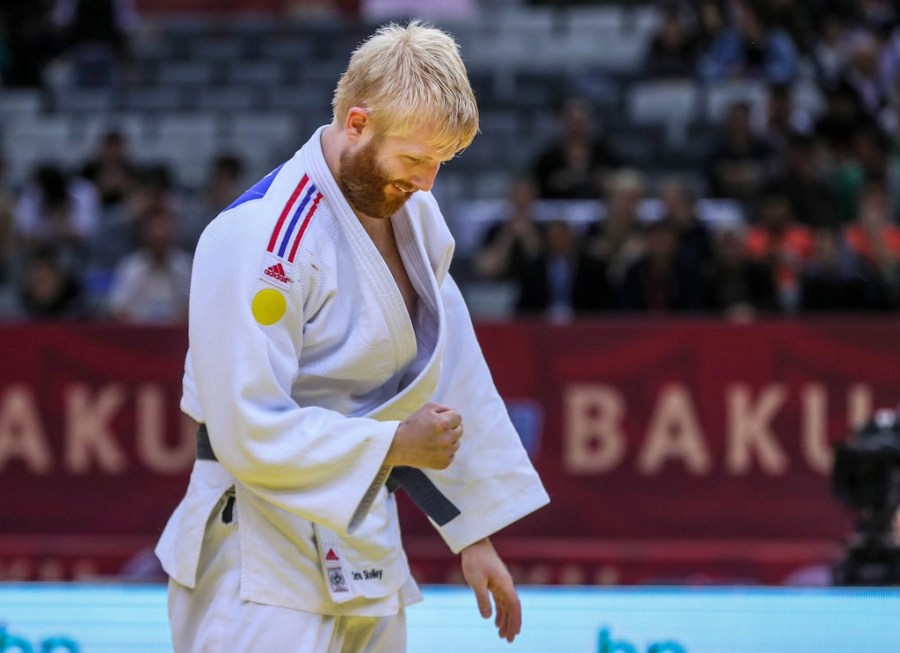Chris Skelley MBE was a typical teenager: contact-sports mad and working towards a career as a mechanic. Then, at the age of 17, his vision began to deteriorate, and his life changed forever.
Skelley was diagnosed with Oculus Albinism, Bell’s Reflex, and Extreme Photophobia which caused him to eventually lose around 70% of his vision. He had to quit his job and say goodbye to any ball sports. Luckily, the tactile nature of judo meant this was one discipline he could continue training.
The now 30-year-old learned to adapt, and through work, grit, and skill, was selected to compete at the Paralympics. He went on to become a European Champion, win two World Championship bronze medals, and placed top of the podium at the 2021 Tokyo Paralympics – GB’s first Para Judo gold since 1996.

How did you first get into judo?
I was a very shy young lad, and my mum and dad wanted to get me into a sport to bring me out of my shell a little bit. They got me into two sports where you have to be very physical with another person, which was judo and rugby. I started at the age of five. Then I carried it on through school and college, so on evenings I wasn’t really on street corners causing havoc.
How did your diagnosis impact your involvement in sport?
I had to stop rugby because I couldn’t see a rugby ball anymore. When I was tackling the wrong person I think that’s when I was like, Maybe this is not my sport anymore! Judo was there still for me, being that constant saviour in my life when I was going through this really tough time mentally. Judo was there to save me and pull me out of that dark period.
How did your approach to judo change with your vision loss?
Judo is one of the easiest sports to adapt for someone with a visual impairment, or who is fully blind, because you can take a hold of someone. You can still throw them. All you have to do is just grip up with someone and start fighting. You don’t really need your eyesight. You need your feel for your hands. It’s a bit scary, because obviously you get chucked about and everything, but it’s a lot of fun when you’re doing it.
At what point did you realise this could become a professional career?
I’ve always been on the England Junior squad, in and around the national team, but at one particular competition, a Paralympic coach saw me and said, “Have you heard of the Paralympic team?” And I was like, “No one’s really mentioned it to me. I’m just trying to survive. I’m trying to just get myself through this really tough time.”
I went on a Paralympian inspiration programme in London. You got to go into the village, live with the athletes, get the feeling of what it is like to be an athlete. And I had that feeling of burning desire actually saying, “I want to do this. I want to be a Paralympic athlete.”
What are the differences between Paralympic and Olympic judo?
The difference between Paralympic and Olympic sport is on the grip. So Olympic judo, you start off the grip; Paralympic judo you start on a grip. The only other difference, really, between Paralympic and Olympic is that the referee will shout ‘jogai’ when you’re near the edge. And for someone who is hearing impaired like myself, they will tap me when to go, and tap me when to stop.
What does your weekly gym routine as an elite judo athlete look like?
I’m looked after by a fantastic strength and conditioning coach called Wayne Lakin. My gym programmes include two heavy sessions a week, and then we do one muscular endurance session, and then my junior coach gets me to do two more conditioning sessions on top of that. So it is a very heavy week. I do a lot of muscular endurance so I can be able to last the four minutes of the fight, but then if you go into golden score (sudden death) it doesn’t have a time on it, so you can be fighting someone for 30 minutes.
What specific workouts get you ready for competition?
We do a lot of clean and snatches, which is very relevant, I think, to judo, because you have to shift a heavy weight quickly. We do blood flow restriction on my arms which basically replicates being gripped up for a long period of time. Then obviously conditioning, which is your rower, your ski, your bike, going up the steps, which really puts your legs under heavy fatigue.
What’s next for you?
I’ve just been selected for the Paralympics in Paris. So hopefully I can go and do what I did in Tokyo.
Chris Skelley will compete in Para Judo at Paris 2024. The event begins on 5 September. Find out more at olympics.com







